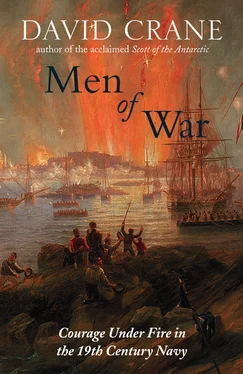It is a fascinating thought that Hastings might have ended up in the North-West Passage – the cradle and the grave of so many nineteenth-century naval reputations – but while there was no vacancy on that expedition Melville had not forgotten him. On the return of the Pelican in 1818 Hastings had gone up to Willesley, and while he borrowed his brother’s gun and played the country gentleman – ‘Frank is trying to be a sportsman,’ his mother reported in a spidery hand made worse by gathering blindness, ‘he has killed a hare & brace of Partridges’ – Lord Melville’s goodwill filtered down through the channels of Admiralty preferment: ‘Lieut F. Hastings to be appointed to the Frigate destined to relieve the Forth,’ a minute for 9 January 1819 reads, ‘it being Ld Melville’s intention to recommend the Lieut to the Bd on that station.’
A fortnight later, on 23 January, the appointment was ratified: ‘Lieut Frank Hastings to be appointed to the command of the Kangaroo Surveying Vessel at Deptford.’ Within another two weeks Hastings was in London, and on 8 February he began entering men into his new ship. At just twenty-four, he had his first command. Four months later it would come to its disastrous end in the harbour of Port Royal. How different the history of the nineteenth-century navy, possibly of Arctic exploration, might have been had John Barrow found room for him on his expedition to the North-West Passage is a matter of poignant speculation: how different Greek history would be is a matter of fact.
V
On 6 March 1821, a Russian general of Greek extraction crossed the River Pruth from Bessarabia into Moldavia, raised his standard emblazoned with a phoenix, and called on the Christian populations of the Ottoman Empire to throw off their Turkish oppressors.
At first glance, the banks of the Pruth might seem a perverse place to start a Greek revolution, but at the beginning of the nineteenth century the abject condition of Greece itself meant that any revival would have to come from without. In the early fifteenth century there had been one last, great flowering of Byzantine culture at Mystra in the southern Peloponnese, but over the four hundred years since Mystra’s fall the geographical area of what is now modern Greece had sunk into a state of oppressed and degraded misery, its traditions of freedom withered to the bandit culture of the mountain regions and all memory of its political and artistic birthright buried under centuries of foreign tyranny.
It was inevitably from western Europe, where there had been a rebirth of scholarly interest in Greek art, that this memory was given back to Greece and to the scattered communities of the Greek diaspora. Throughout the eighteenth century these colonies had flourished at ports and cities throughout the mercantile world, and as this renewed sense of identity became a fixed part of the émigré consciousness, the fashionable Hellenism of the dilettante was transformed into a heady cocktail of political theory, revolutionary fervour and Byzantine nostalgia.
For the nineteenth-century Greek, it was supremely Constantinople – the ‘ polis ’ – and not Athens that was the historical centre of the Greek world, and it was no coincidence that the movement for Greek freedom found its focus and leadership there. For the best part of four centuries the great Christian families of the Phanar * had arrogated to themselves all the tasks that Muslim indolence or fastidiousness would allow them, and it was the wretchedly inept son of one of these princely families, the one-armed Alexander Ypsilanti, who in the spring of 1821 crossed the Pruth to spark off a Greek revolt that only the Turks themselves cannot have seen coming.
Ypsilanti’s campaign was a fiasco – by June it was over and he had shamefully fled to Austria – but as news of the uprising spread and the Greek flag was raised on Peloponnesian soil, fantasy had suddenly become fact. For centuries Greeks and Turks had been living within the empire side by side, and within weeks the Ottoman-Greek world was in flames, as community turned on community in a religious and racial war of a hatred and savagery that would have beggared the imagination of a Goya.
And as massacre followed massacre – Athens, Constantinople, Tripolis, Smyrna, Nicosia, Kos, Rhodes – it was inevitably the plight of the Greeks that excited the sympathy and indignation of the Christian West. In its earliest days European philhellenism was largely an academic pastime, but under the influence of Byron’s verse it became a popular cause that within months had inspired the first volunteers – Swedes, Danes, Bavarians, Saxons, Prussians, Italians, Russians, French, British and Americans – to raise, beg and borrow the money to make their way east to save the cradle of Western culture and political freedoms. ‘Fair Greece! Sad relic of departed worth!’ wrote Byron,
Immortal, though no more; though fallen, great!
Who now shall lead thy scatter’d children forth,
And long accustom’d bondage uncreate?
Not such thy sons who whilome did await,
The hopeless warriors of a willing doom,
In bleak Thermopylae’s sepulchral strait –
Oh! Who that gallant spirit shall resume,
Leap from Eurotas’ banks, and call thee from the tomb?
‘We are all Greeks now,’ Shelley proudly proclaimed from the cosy safety of Italy, but if this sounded good, what was actually meant by it would have been hard to define. Among the first volunteers who sailed out to fight were refugees from monarchical despotism who would have thrilled to the language of Shelley’s ‘Hellas’, yet side by side with them were academic dreamers and romantic fantasists, Byronic poseurs and aristocratic democrats, deluded Benthamites and disenchanted Bonapartists, charlatans and orthodox co-religionists, fortune-hunters, mercenaries and unemployed and unemployable military professionals, the flotsam and jetsam of a whole European generation who had known nothing but war. ‘What a queer set,’ the American doctor, Samuel Gridley Howe, one of the greatest of all philhellenes, wrote of these men – heirs at once in their mix of naïveté and depravity to the Children’s Crusade and the condottieri of fourteenth-century Europe. ‘What an assemblage of romantic, adventurous, restless, crack-brained young men from the four corners of the world. How much courage and talent is to be found among them, but how much more of pompous vanity, of weak intellect, of mean selfishness, of utter depravity … Little have Philhellenes done towards raising the reputation of Europeans here.’
The disappointment was not all one-way, because if these were seldom the kind of volunteers to inspire the Greeks with a keen sense of gratitude, the feeling of disillusionment on their arrival was invariably mutual. The one belief that sustained most philhellenes was the conviction that they were defending the heirs to ancient Greece, and when instead of Pericles and Epaminondas they found a nation of mountain bandit warriors as ready to behead, baptise or sodomise their Ottoman victims as the Turks were to enslave, circumcise and impale theirs, the revulsion was as intense and irrational as the enthusiasm it replaced.
In the whole history of the Greek War of Independence no more than a handful of foreigners ever bridged the cultural gap between the Greece of the imagination and the Greece of reality, and incomparably the greatest of these after Byron was Frank Abney Hastings. In many ways Hastings belonged to the mainstream of philhellene life, but even as a citizen with a grudge and a fighting man without a war there were crucial differences about him – differences of wealth, talent and temperament – that equipped him to survive a Homeric world of factionalism, greed, treachery and violence with a resilience that few other foreigners could match.
Читать дальше











